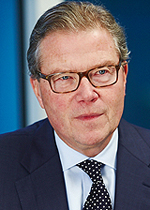 |
| AstraZeneca CEO Pascal Soriot |
Hold on a minute, says AstraZeneca ($AZN) CEO Pascal Soriot. Now that the dust has settled on Pfizer's ($PFE) failed bid for the U.K. company, Soriot disputes the wisdom of tying his pay--and that of his fellow executives--to the would-be return on that defunct deal.
The idea of linking AstraZeneca's management compensation to Pfizer's spurned bid came from Old Mutual Global Investors' Richard Buxton, in a letter to the Financial Times. After all, to fend off Pfizer's unwanted advances, Soriot and Chairman Leif Johansson rolled out a rosy set of sales projections. If AstraZeneca could hit such lofty targets, then shareholders would see a big payoff down the line--a bigger payoff than Pfizer's here-and-now buyout offer.
But projections are just that: no guarantees. So, Buxton made his public suggestion: If shareholders suffer because of AstraZeneca's stubborn refusal to negotiate with Pfizer, then its leadership should suffer, too. Management's incentive pay should be set to vest "only at the level of the spurned takeover"--a.k.a., £55 per share, he contended.
Predictably, Soriot is taking shots at that idea. Share price targets are "a very crude instrument," he told the FT in an interview published over the weekend. Stock prices aren't just a function of company performance, but of the broader market, he pointed out. "If the stock market goes up, you can get to the target relatively easily. If it goes down, it becomes very hard."
 |
| AstraZeneca Chairman Leif Johansson |
Soriot would rather his pay be linked to goals he can control. Though the board is open to new ideas on compensation, "Our long-term incentive program is already aligned with growth targets and pipeline delivery," he told the London-based newspaper.
This isn't the first time Soriot's compensation packages has made headlines, however. When AstraZeneca awarded him a signing bonus of sorts--designed to replace some payoffs he would relinquish by leaving his former employer, Roche ($RHHBY)--some critics pounced. It was $6.4 million, after all, and Soriot hadn't yet done a thing to turn the company around.
That criticism blew over. Last month, though, shareholders spanked AstraZeneca's board by voting against its compensation program. The vote wasn't expected. Without the extra payment he collected in 2012, Soriot's total pay for 2013 fell to £3.34 million, or about $5.6 million; no great shakes compared with other Big Pharma execs. Still, the company said that it would "carefully analyze" its compensation plans "and talk to our shareholders to fully understand any concerns."
- see the story in the FT (reg. req.)
Special Report: Top 10 pharma companies by 2013 revenue - AstraZeneca